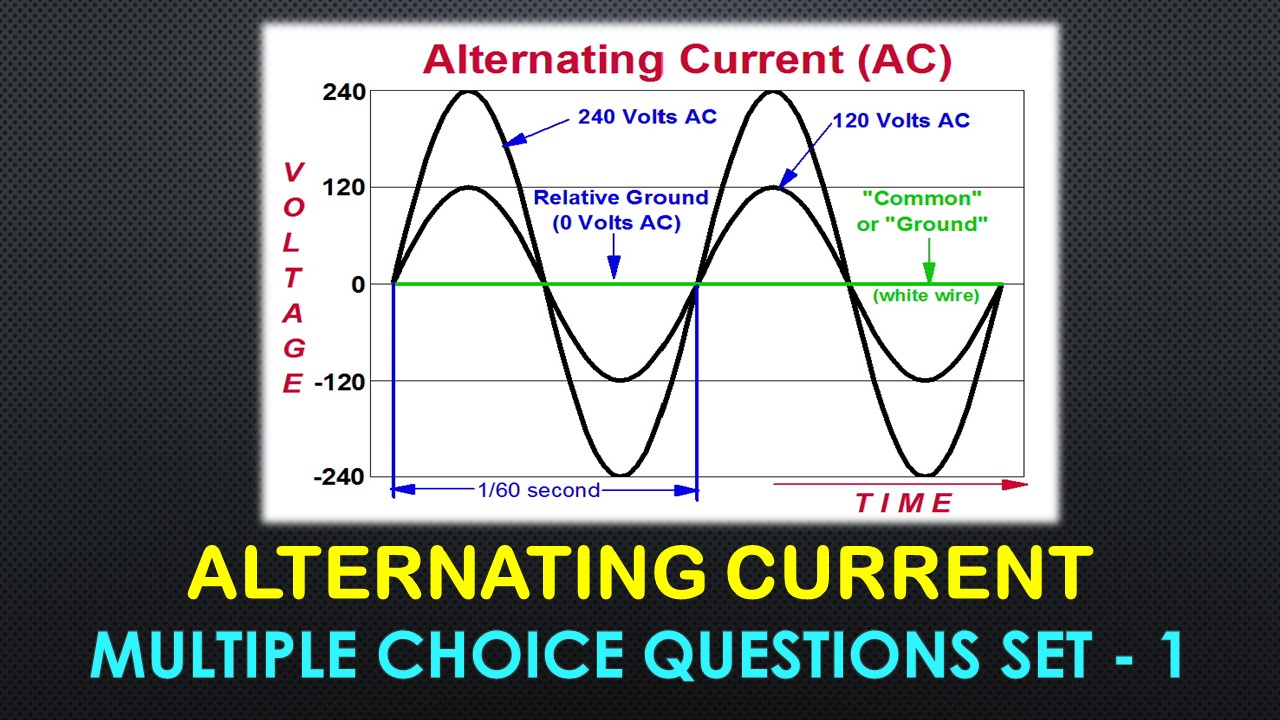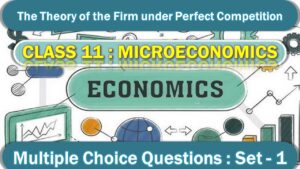CBSE Class 12 Alternating Current Multiple Choice Questions with Answers. MCQ Questions Class 12 Alternating Current with Answers Is Prepared Based on Latest Exam Pattern. Students can solve NCERT Class 12 Alternating Current MCQs with Answers to know their preparation level.
Students who are searching for NCERT MCQ Questions for Class 12 Alternating Current with Answers are compiled here to get good practice on all fundamentals. Know your preparation level on MCQ Questions for Class 12 Alternating Current with Answers. You can also verify your answers from our provided MCQ Class 12 Alternating Current with Answers. So, ace up your preparation with MCQ of Class 12 Physics Examinations.
MCQ Questions Class 12 Alternating Current with Answers - Set - 1
Question 1:
In an a.c. circuit, the instantaneous values of current and e.m.f. are given by: I = I0 sin(ωt + π/2) and E = E0 sin ωt. The power P consumed in the circuit is:
(a) E0I0/√2
(b) EI√2
(c) Zero
(d) E0I0/2
Correct Answer – (C)
Question 2 :
For LCR series circuit, the current will be maximum when:
(a) XL = 0
(b) XC = O
(c) XL = XC
(d) R = XL + XC.
Correct Answer – (C)
Question 3 :
When 100 V d.c. applied across a solenoid a current of 1.0 A flows in it. When 100 V a.c. supply is applied across the same coil, the current drops to 0.5 A. If the frequency of a.c. source is 50 Hz, the impedance and inductance of the solenoid are:
(a) 200 Ω and 0.55 H
(b) 200 Ω and 1.0 H
(c) 100 Ω and 0.93 H
(d) 100 Ω and 0.80 H
Correct Answer – (A)
Question 4 :
With increase in frequency of applied a.c. supply, the impedance of LCR series circuit:
(a) increases
(b) decreases
(c) first decreases, becomes minimum and then increases.
(d) remains constant.
Correct Answer – (A)
Question 5 :
The capacitive reactance in an a.c. circuit is:
(a) effective wattage
(b) effective voltage
(c) effective resistance due to capacity
(d) None of these.
Correct Answer – (C)
MCQ Questions Class 12 Alternating Current with Answers
Question 6 :
An alternating voltage is connected in series with a resistance R and an inductance L. If the potential drop across the resistance is 200 V and across the inductance is 150 V, then the applied voltage is:
(a) 350 V
(b) 500 V
(c) 250 V
(d) 300 V
Correct Answer – (C)
Question 7 :
In an a.c. circuit, the current
(a) always leads the voltage,
(b) always lags behind the voltage
(c) is always in phase with the voltage
(d) may lead or lag behind or be in the same phase with the voltage.
Correct Answer – (D)
Question 8 :
The current in an LCR series circuit when frequency of applied a.c. supply is increased:
(a) increases
(b) decreases
(c) first increases becomes maximum and then decreases.
(d) first decreases becomes minimum and then increases.
Correct Answer – (C)
Question 9 :
Of the following about the capacitive reactance which is correct:
(a) capacitive reactance is inversely proportional to the frequency of a.c.
(b) capacitive reactance is measured in Farad.
(c) The reactance of the capacitor is directly proportional to its ability to store charge.
(d) None of these.
Correct Answer – (A)
Question 10 :
Ohm’s law expressed as E = IR.
(a) may never be applied to a.c. circuits
(b) always applied to a.c. circuits as to d.c. circuits when Z is substituted for R.
(c) tells us that Eeff = 0.707 E0 for a.c.
(d) None of these.
Correct Answer – (B)
- NCERT Solutions Class 11 Chemistry Chapter 1 : Some Basic Concepts of Chemistry
- NCERT Solutions Class 11 Chemistry Chapter 2 : Structure Of The Atom
- NCERT Solutions Class 11 Chemistry Chapter 3 : Classification of Elements and Periodicity in Properties
- NCERT Solutions Class 11 Chemistry Chapter 4 : Chemical Bonding and Molecular Structure
- NCERT Solutions Class 11 Chemistry Chapter 5 : States of Matter
- NCERT Solutions Class 11 Chemistry Chapter 6 : Thermodynamics
- NCERT Solutions Class 11 Chemistry Chapter 7 : Equilibrium
- NCERT Solutions Class 11 Chemistry Chapter 8 : Redox Reactions
- NCERT Solutions Class 11 Chemistry Chapter 9 : Hydrogen
- NCERT Solutions Class 11 Chemistry Chapter 10 : The s-Block Elements
- NCERT Solutions Class 11 Chemistry Chapter 11 : The p-Block Elements
- NCERT Solutions Class 11 Chemistry Chapter 12 : Organic Chemistry: Some Basic Principles and Techniques
- NCERT Solutions Class 11 Chemistry Chapter 13 : Hydrocarbons
- NCERT Solutions Class 11 Chemistry Chapter 14 : Environmental Chemistry




